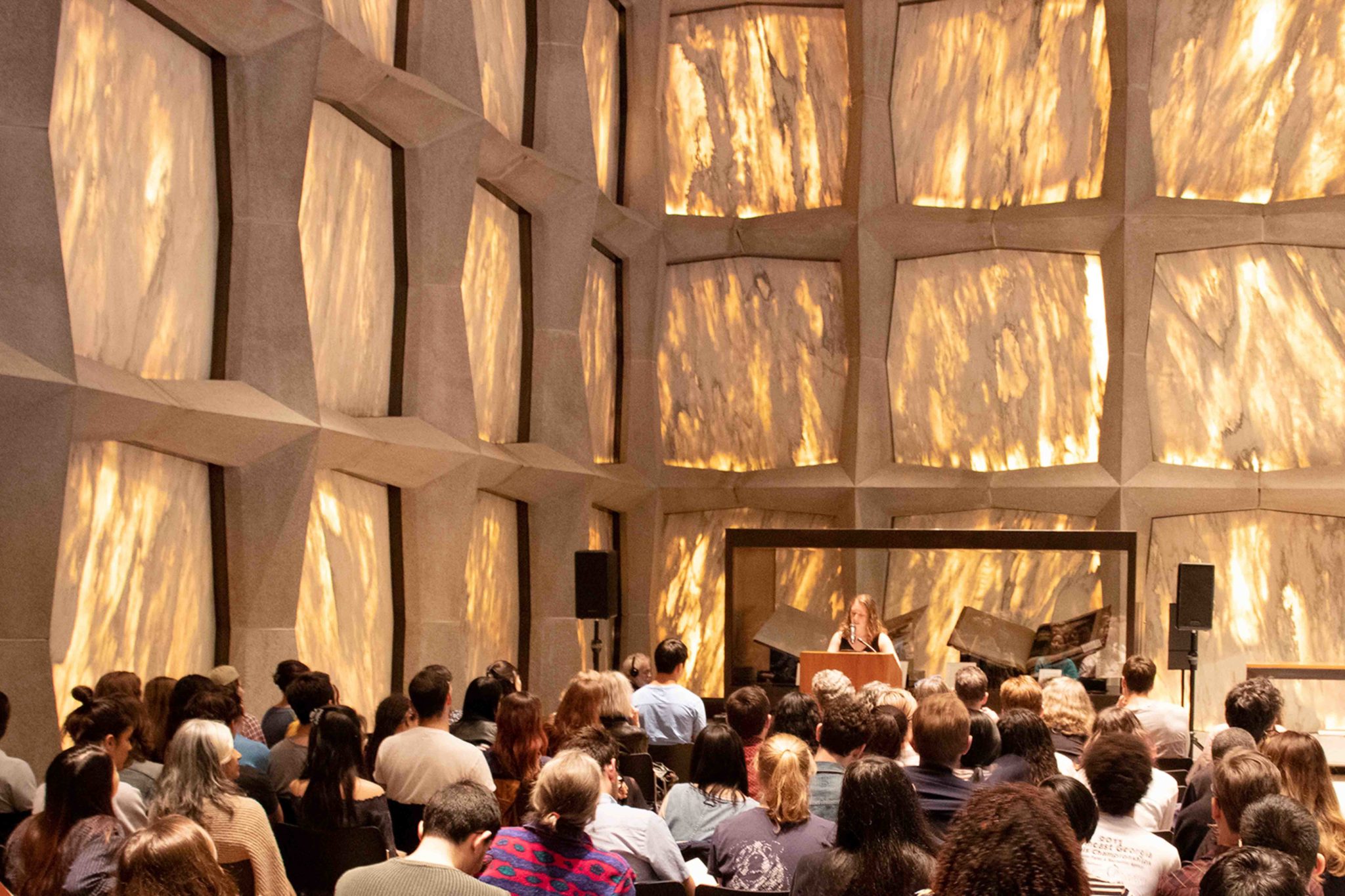
Courtesy of Michael Morand
On Tuesday afternoon, eight student poets gathered in the Beinecke Rare Book and Manuscript Library to read their work before an audience of roughly 100 members of the Yale and New Haven communities.
The event was part of the Yale Collection of American Literature reading series and was cosponsored by the English Department’s creative writing program. Each student poet read two to four of their works, some of which were printed in pamphlets and distributed to the audience.
“This is my favorite day of the year,” Nancy Kuhl, Beinecke curator of American poetry, said in her opening remarks for the reading.
According to Kuhl, the reading has been an annual spring tradition since 2002. Early in the spring semester every year, she reaches out to faculty members in creative writing to solicit nominations for students to read at the event. Kuhl then works with selected students to create a chapbook — a pamphlet of literary works — containing their poems. Kuhl said that by showcasing works by students both within and outside the creative writing program, the event is able to capture “a broader sense of poetry at Yale.”
“Yale has a long history of being strong and interested in poetry and there are so many terrific poets on campus that aren’t just in the English Department,” said Richard Deming, director of the creative writing program. He added that the event gives students a chance “to read amongst some of the greatest works ever written by the human race, there in the Beinecke.”
For Rachel Kaufman ’19, the Beinecke reading is an opportunity to share the “melodies” of her poetry with the audience.
“Unless your reader is somehow in your mind, and knows the intonations, the liltings and wiltings in it, it’s hard to know that your scripted melody is reaching their ears,” Kaufman said. “When you’re reading it out loud, you can give the sounds that you’re imagining to the audience.”
Kaufman, a double major in English and history, read poems from her collection “Many to Remember,” which was inspired by her historical research on the Mexican Inquisition and New Mexico crypto-Jewish memory. She said that she “wanted to write archival poetry” and “to see what the history feels like in a different form.”
Kuhl explained that sound is a part of a poem’s meaning, and that hearing a poem in the poet’s own voice can be “transformative” to a reader’s understanding of a written work. Magda Andrews-Hoke ’19, a double major in linguistics and English, encouraged audience members to note the “sonic quality” of her poems.
“Do they read it quickly, breathlessly, or slowly and deliberately?” Deming said. “Those things are part of the life of a poem. The poem is a kind of music and is meant to be heard, taken into the body and felt directly that way.”
Art major Miles Kim ’20, who read at the event, said he has always been interested in creating art in a variety of forms.
“The amazing thing about poetry is that the communicative process is completely direct — the medium is almost your own thought,” said Kim, “It’s a very direct and honest way of communicating with your audience that I’ve always been drawn to.”
Chalay Chalermkraivuth ’20, who attended the event, said that she appreciated the opportunity to see how the poets “conceptualize their own poetry.” She said that “when you hear someone reading, there’s a lot that comes out that isn’t on the page.”
For Kuhl, the annual readings are “a window into the current state of the art” of poetry. She explained that hearing the work of young writers is a way to “see what’s happening in poetry right now.”
“[The readings] are always full of surprises,” said Kuhl. “There are so many diverse voices represented. Every year, there are students writing poetry that is not like any we’ve heard before at this event and there are students working in new ways in time-honored traditional standard forms. We really see a range of all the different possibilities in poetry.”
Yale has a strong creative writing community both inside and outside of the classroom, according to Deming. In creative writing classes, “you can have really terrific molecular biologists sitting next to computer scientists … all writing poems or stories,” Deming said, which makes “the conversation really textured and nuanced, because people have such different perspectives to offer.”
Deming said that poetry is becoming more and more diverse. He said that “people are experimenting a lot and doing very exciting things.”
“There’s an openness to the possibility of what poetry can be,” Deming said.
Carrie Zhou | carrie.zhou@yale.edu







